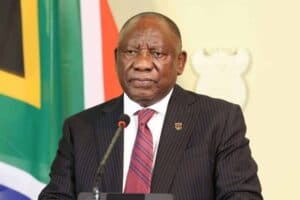Gender-based violence happens to real women with real lives and the president and finance minister need to allocate money to show we are serious about fighting it.

Gomolemo Legae, an 18-year-old young woman from Mahikeng, was brutally murdered during the “16 days of activism against the abuse of women and children” by her 18-year-old boyfriend. Gomolemo’s case is yet another example of what we now glibly call gender-based violence (GBV). Just a few months ago Uyinene Mrwetyana’s brutal murder sparked national protests around South Africa. Speeches, promised policies and addresses were all made like they’ve been made for the past 10 years.
GBV has become yet another acronym that is bandied about as though the brutality of what happened to Gomolemo, Uyinene and many other women who have died at the hands of their partners has little to do with us. We behave as if the war on female bodies does not happen to women we know, women who are our daughters, friends, grandmothers, aunts, sisters, wives, mothers and lovers.
Yet, year after year, police statistics continue to attest to the fact that it is women like us and women close to us who are vulnerable to violence for the simple fact that, like us, they are women and girl children.
According to the annual crime statistics, in the 2018/19 period the SAPS recorded 52,420 sexual offences, which represents an average of 113 rapes reported to the police per day. Ninety percent of victims of sexual violence above the age of 10 were female. An alarming 46.5% of victims of sexual assault were children.
We may not wish to admit it, but violence against women and children is woven deep into the fabric of our society. It can be found in our silence when we hear bangs, screams and cries next door. It can be seen when we walk past a woman being slapped and sworn at in the street. It lies in the violent ways we communicate with each other in our families, in social spaces, political platforms and at work. We turn a blind eye to the abuse of women and children every day.
Ghanaian-American novelist Yaa Gyasi wrote that when we look back on devastating events in history we have to remember “that they happened to individuals, not a faceless mass”. Gyasi was referring to the 19th-century slave trade, but she could just as well have been speaking about gender-based violence.
On the 30th of October 2019, when Finance Minister Tito Mboweni tabled the Medium-Term Budget Policy Statement, he mentioned GBV only once. He said: “We should give renewed impetus to the fight against gender-based violence and xenophobia”. This was exactly three months after the president stood in front of the nation and told us that GBV is a priority and that his government would treat the scourge as a national crisis. The president’s words will remain just empty promises unless he ensures government invests time and money in the National Strategic Plan on GBV.
Many ask how putting money into GBV would help combat these brutal acts of violence against women, particularly when it happens in the privacy of their homes.
We need a massive rollout of GBV awareness programmes in the same vein as the HIV/Aids campaigns that opened dialogue and destigmatised the disease.
Dialogues should be initiated in our taverns, churches, buses, clinics, hospitals and the very police stations where people go to report GBV. Money should be invested in the training of police officers on how to deal with victims affected by GBV, counselling, forensics (rape-kits, etc) and in appointing skilled prosecutors, judges and magistrates who are sensitised to work on sexual offence cases and child-related crimes.
It is time to stop just talking about fighting GBV but actually taking action to stop it. This means President Ramaphosa and Minister Tito Mboweni need to announce exactly how much they will be allocating to the National Strategic Plan on GBV in their 2020 state of the nation and budget speeches.
Palesa Ramolefo is a journalism graduate and a 2019 amandla.mobi Campaigner Fellow. She is passionate about making Africa a safe continent for Black women, children and the LGBTQI+ community. Follow her on Twitter @Palesa_Ramolefo.
For more news your way, download The Citizen’s app for iOS and Android.






